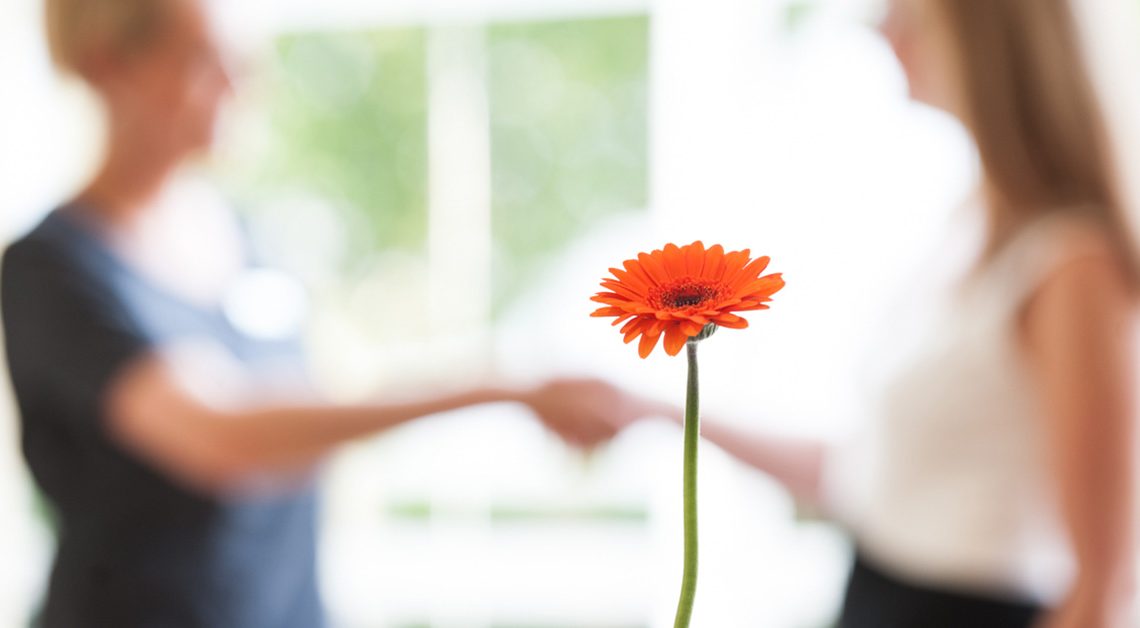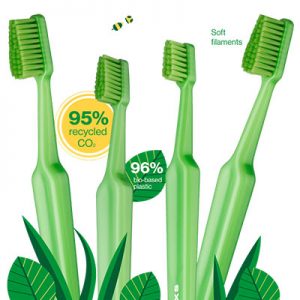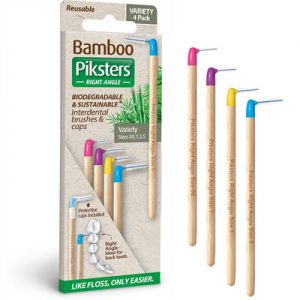

It cannot be denied that the daily oral hygiene regime advocated by the dental team includes products derived from plastics. Alternatives are coming to market, but the safety, ethics and sustainability of them should not compromised. Hopefully this short blog may shed some light on the professional concerns and offer a better understanding to alternative products available.
The first consideration must be recycling the products we use. Cut the head off a manual toothbrush, remove the floss from a Flosspick and recycle the handles. Unfortunately, many toothbrushes and dental products are made of multiple material, many of which incorporate rubber or silicone. Electric toothbrush heads use less plastic, but contain other materials, making recycling difficult.
Both TePe and Terracycle a piloting schemes in dental practices to collect mixed dental plastic waste and recycle it. The numbers of participants are limited and currently the scheme is oversubscribed. This sounds the perfect solution. Unfortunately, there are currently no facilities in the UK to complete this recycling process. These products are having to be shipped abroad to be recycled, increasing the carbon footprint of the whole scheme.
TePe have launched their ‘Good’ toothbrush and was the first mass produced bioplastic toothbrush of its kind. The handle is derived from sugar cane and 100% bio-based filaments from castor oil. To ensure the filament are secured safely to the head, metal pins are used, making the toothbrush 96% bio-based. Another plus point is the manufacturing process, which uses renewable energy, part of which is from TePes own roof top solar panels. Tepe are hoping to roll out their bio-plastic to their whole range, but this will take time. The drawback to these products. It is still a plastic and will not bio degrade.
Bamboo is another option, fast growing, minimal water required and easily harvested. The world’s largest producers of bamboo are China and India. In the race to find sustainable alternatives to plastic the issue of ensuring ethically sourced alternatives should not be ignored.
Piksters have launched a range of bamboo interdental brushes. Produced from Moso Bamboo, it does not require pesticides or fertilisers. The company assure ‘the quality control team directly manages the certification process ensuring that their products are ethically sourced’.
It is important not to forget where dental products are used, the mouth, the gateway to the body. Therefore, the quality of these products should not be compromised.
For many years’ nylon has been the product of choice for toothbrush filaments. The ability to manufacture rounded filaments less traumatic to the soft tissues and that dry quickly to reduce the proliferation of bacteria. The availability of bamboo toothbrushes is a growing market, the majority of which use nylon filaments. Bioplastics may be the more hygienic alternative.




This especially relates to toothpastes. Plastic is the obvious choice. Cheap to manufacture, light and ensures the longevity of their contents. The alternatives are toothpaste tablets and powders. The drawbacks are that the majority of these do not contain fluoride and can be often abrasive, causing potential damage to the tooth enamel and soft tissues. The challenge is to find products that contain a suitable level of fluoride and are not too abrasive on tooth tissue.
There are some companies producing such toothpaste products. One company provide a range in tubes using the ‘Albea Greenleaf Technology’ and recycled plastic, reducing their carbon footprint by 34%. Others are producing toothpaste tablets in cardboard boxes or recyclable glass bottles. Unfortunately, there are several suppliers of toothpaste tablets that are not tooth friendly.
Within the dental arena all clinical and sharps waste produced must be collected by appropriately registered companies and incinerated. When this process takes place, it will produce approximately 50% energy and 50% bottom ash. Burning good quality plastic can improve the energy output and quality of bottom ash of which 40 to 50% is used to build and repair our roads. This is not an ideal option, but the hard reality of the legality of clinical waste disposal.
Offering sustainable environmentally friendly products poses a myriad of dilemmas. Maybe Newtons third law of physics sums it up nicely. ‘For every action, there is an equal and opposite reaction’.
If you’d like more information on the sustainable dental products that we supply, call us today on 01275 842550


BRACES


BONDING


Dental Health Plan
We are accepting new patients, book an introduction call today
Book An Introduction Call
Portishead means more to us than a place of work - it’s home.
We’ve written an open letter to our local community to share what Evolve Dentistry truly stands for: compassion, authenticity, respect, and doing the right thing - always.
This practice was built with people at its heart. Not transactions, not targets - but neighbours, families, familiar faces and lasting relationships.
If you are part of this wonderful town - whether you’ve been with us for years or are simply curious about who we are - we’d love you to take a few moments to read it.
Thank you for trusting us to care for your smiles. We are incredibly proud to belong here.
👉 Read our letter to Portishead - link in bio.
#Portishead #Community #EvolveDentistry #Portishead
#PortisheadBusiness
#PortisheadLife
#NorthSomerset
#Gordano
#LovePortishead
#supportlocalsomerset
#CommunityMatters
#LocalCommunity
#IndependentBusiness
#ProudToBelong
#ServingOurCommunity
#EthicalBusiness
#dotherightthing
#EvolveDentistry
#PrivateDentistry
#FamilyDentist
#DentalCare
#SmileConfidence
#PatientCare
#ModernDentistry


Huge congratulations to Maisie 🎉
We are so proud to share that our trainee dental nurse, Maisie, has officially passed her dental nurse exams!
Maisie has worked incredibly hard alongside her training here at the practice, showing real dedication to her learning and to our patients every single day. From supporting clinicians chairside to helping create a calm, welcoming environment, she has grown in confidence and skill throughout her journey.
Becoming a qualified dental nurse is a fantastic achievement, and we couldn’t be happier for her. Please join us in congratulating Maisie next time you see her at the practice! 👏
Well done, Maisie – we’re so proud of you. 💙
#DentalNurse #TeamEvolve #PracticeLife #DentalTeam #ProudMoment


Thinking about straightening your teeth but unsure where to begin?
Lisa breaks down the difference between clear aligners and fixed braces - simply, clearly and without the jargon.
Both are effective. Both can create beautiful results. The right choice depends on you.
Watch the video to learn more, and if you’d like personalised advice, we’d be delighted to help.
#PortisheadBusiness #FamilyDentist #Orthodontics #DentalCare #SmileJourney #EvolveDentistry


🦷 Did you know your oral health affects your whole body?
Your mouth doesn’t exist in isolation. Gum health, inflammation and oral hygiene can all play a role in your wider wellbeing – from heart health to confidence and mental wellness.
We’ve just published a new blog exploring the link between oral health and overall wellness, and why looking after your teeth and gums is about much more than your smile.
If you’re interested in oral health and general health Portishead, this is a great read and a helpful reminder of how small daily habits can support long-term health.
Link in bio


When is root canal treatment needed?
It’s a question many patients ask — and in this video, Richard explains it clearly and simply.
Root canal treatment is usually needed when the nerve inside a tooth becomes inflamed or infected. This can happen because of deep decay, a crack in the tooth, repeated dental work, or sometimes after an injury.
You might experience symptoms like persistent toothache, sensitivity to hot or cold that lingers, pain when biting, or swelling around the gum. However, sometimes there are very few symptoms at all — which is why regular check-ups at the practice are so important.
The good news is that root canal treatment is designed to relieve pain, not cause it. It removes the infection, saves the natural tooth, and helps you avoid extraction.
Watch Richard’s video to understand the signs to look out for — and if you’re worried about a tooth, get in touch with our reception team for advice.


Smile Hack 🍎🥕
Love a sweet treat? Jane shares a simple swap that your teeth will thank you for.
Sticky sweets cling to your teeth and sit in the tiny grooves for longer, feeding the bacteria that cause decay. The longer they stick around, the more damage they can do.
Instead, try swapping them for crunchy veg or a handful of nuts. Foods like carrots, cucumber and peppers have a natural crunch that helps stimulate saliva, which protects your teeth. Nuts are also a lower-sugar option and far less likely to cling to enamel.
Small changes really do make a big difference over time.


Are electric toothbrushes better than manual?
It’s a question we’re asked a lot at the practice – and in this video, Carol gives a clear, honest answer.
Electric toothbrushes can make it easier to clean effectively, especially if you struggle with technique, brushing for long enough, or reaching certain areas. Many people find they remove plaque more consistently, simply because they do most of the work for you.
That said, a manual toothbrush can still do a great job when used properly. It’s less about the brush itself and more about how you use it.
Watch Carol’s quick explanation to find out what we usually recommend – and how to make sure you’re getting the most from your brushing routine.
If you’re unsure whether your brushing technique is working for you, mention it at your next appointment and we’ll be happy to guide you. 🪥





